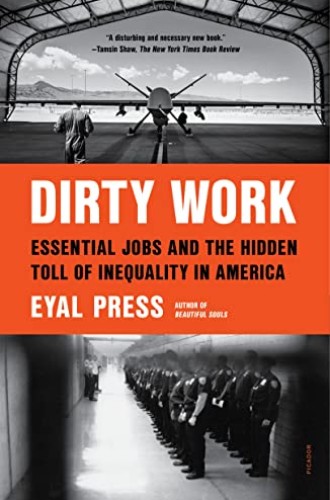Who’s doing our dirty work?
Eyal Press looks inside the daily lives of prison workers, drone warriors, and meatpackers.
“The powerless must do their own dirty work. The powerful have it done for them.” These words from James Baldwin provide an apt epigram for journalist Eyal Press’s powerful and convicting new book. Press reveals the hidden importance of dirty work for the functioning of society as we know it and questions the averted gaze of the powerful to the work being done in their name.
He begins by looking backward to the journals of Everett Hughes, an American sociologist who visited Frankfurt in 1948. At dinner, enjoying the company of “liberal intellectual people,” Hughes was struck by the dissonance present in the conversation. One man spoke of the shame and pressure he felt to “join the party” as the Nazis rose to power—and in the very same breath stated that “the Jews, they were a problem . . . the lowest class of people” who would come to Germany and get rich off the jobs that should have gone to native-born Germans. Hughes’s dinner companions could not admit that the Nazis rose to power under their averted gazes as they unconsciously gave thanks that somehow “the Jewish problem” was being solved.
For Press, this is the nature of dirty work. It is the “unethical activity . . . delegated to certain agents and then conveniently disavowed” by society at large. He pushes readers to ask ourselves what kind of dirty work we avert our eyes from. Dirty work requires that “good people” are able to disavow responsibility for it, even as they benefit from it in their daily lives. It is often hidden, falling on undocumented immigrants, people of color, and women. It is reinforced by a lack of “the will to know” among the privileged even as it often causes significant harm to people, animals, and the environment.





